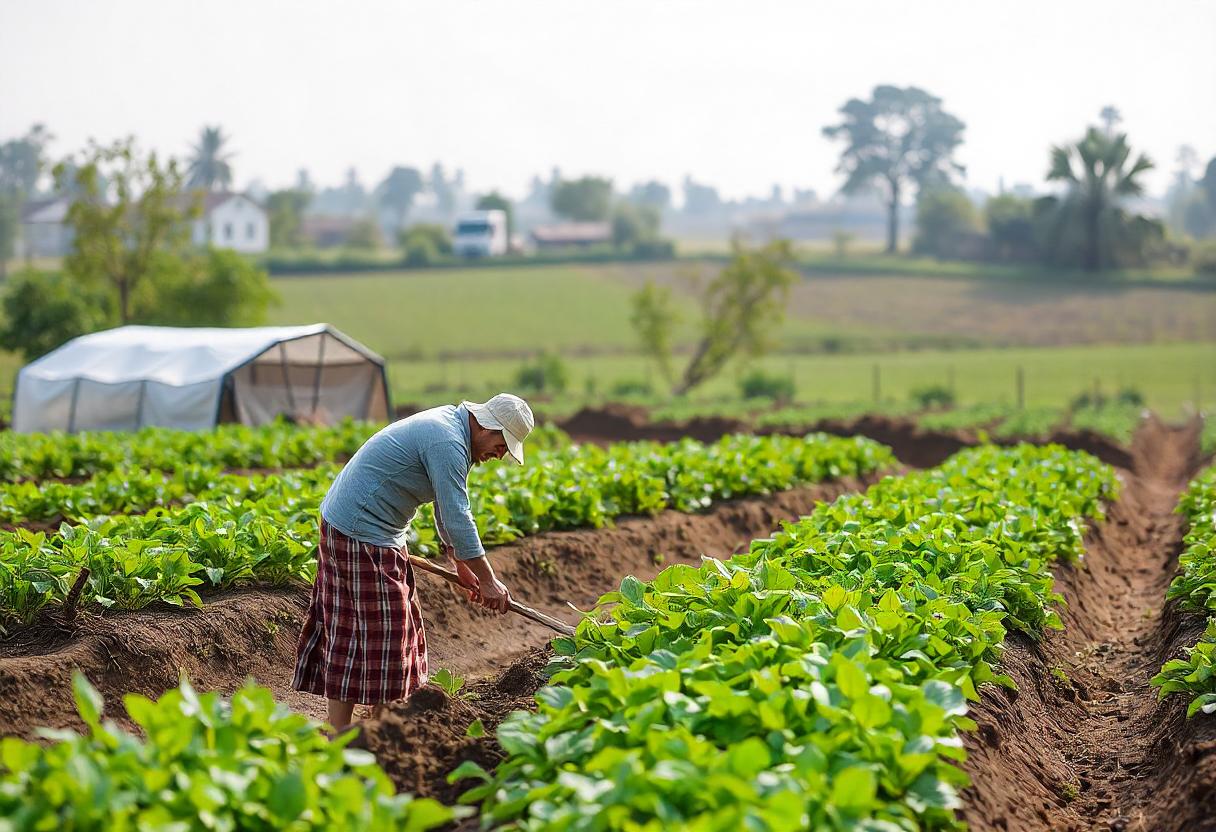
Introduction
Organic farming is an agricultural practice that seeks to produce food and fiber while minimizing the use of synthetic chemicals and preserving environmental health. This method relies on natural processes and biodiversity to maintain soil fertility, control pests, and promote sustainable agricultural systems. Originating as a reaction to the industrialization of agriculture, organic farming has grown in importance and popularity due to its potential benefits for health, the environment, and local economies.
Principles of Organic Farming
- Soil Health and Fertility Organic farming emphasizes maintaining and enhancing soil health through natural processes. This includes:
- Composting: Organic matter is recycled to enrich soil with nutrients.
- Green Manures: Cover crops such as legumes are grown and then incorporated into the soil to add nitrogen and improve soil structure.
- Crop Rotation: Alternating crops in a sequence to prevent soil depletion and manage pests and diseases.
- Biodiversity A cornerstone of organic farming is promoting biodiversity both on and off the farm:
- Polyculture: Growing multiple crops in the same space to reduce the risk of pest outbreaks and improve resilience.
- Habitat Conservation: Preserving natural habitats around farm fields to support wildlife and beneficial organisms.
- Pest and Disease Management Organic farming uses integrated pest management (IPM) strategies:
- Biological Controls: Utilizing natural predators and parasites to control pest populations.
- Cultural Practices: Adjusting planting times, spacing, and crop varieties to reduce pest and disease risks.
- Mechanical Controls: Using barriers, traps, and manual removal of pests.
- Avoidance of Synthetic Chemicals Organic farming avoids synthetic pesticides, herbicides, and fertilizers. Instead, it relies on:
- Natural Pesticides: Such as neem oil or insecticidal soap.
- Organic Fertilizers: Like bone meal, fish emulsion, and seaweed extracts.
- Animal Welfare Organic standards require humane treatment of animals, including:
- Access to Outdoors: Animals must have access to pasture and natural light.
- Organic Feed: Animals must be fed organic feed, free from antibiotics and growth hormones.
Benefits of Organic Farming
- Environmental Health Organic farming promotes a healthier environment by:
- Reducing Chemical Runoff: Lower usage of synthetic chemicals minimizes water contamination and harm to aquatic life.
- Enhancing Soil Health: Practices such as composting and cover cropping improve soil structure and fertility.
- Human Health Organic products are often sought for their potential health benefits:
- Reduced Exposure to Chemicals: Organic farming reduces exposure to synthetic pesticides and fertilizers.
- Nutritional Benefits: Some studies suggest that organic produce may have higher levels of certain nutrients and antioxidants.
- Sustainability Organic farming supports long-term sustainability by:
- Preserving Resources: Enhancing soil health and reducing water pollution ensures resource availability for future generations.
- Climate Change Mitigation: Practices such as carbon sequestration in soil and reduced greenhouse gas emissions contribute to climate change mitigation.
- Economic Impact Organic farming can benefit local economies:
- Market Demand: Growing consumer demand for organic products can provide new economic opportunities for farmers.
- Local Economies: Organic farms often sell directly to consumers through farmers’ markets or community-supported agriculture (CSA) programs, boosting local economies.
Challenges of Organic Farming
- Higher Costs Organic farming can involve higher production costs due to:
- Labor-Intensive Practices: Techniques such as hand weeding and manual pest control can be labor-intensive.
- Certification Costs: Obtaining organic certification can be expensive and time-consuming.
- Yield Variability Organic farms may experience:
- Lower Yields: Compared to conventional farms, organic farms may produce lower yields due to the reliance on natural pest control and soil fertility practices.
- Weather Dependence: Organic methods can be more vulnerable to weather-related issues, affecting crop yields.
- Market Access Organic farmers may face challenges in:
- Access to Markets: Finding markets and achieving fair prices for organic products can be challenging, especially in regions with less developed organic infrastructure.
Organic farming represents a holistic approach to agriculture, prioritizing environmental health, human well-being, and sustainability. While it faces challenges such as higher costs and market access, its benefits in terms of ecological balance, reduced chemical exposure, and support for local economies are significant. As consumer demand for organic products continues to grow, organic farming is likely to play an increasingly important role in the future of agriculture. By embracing organic practices, farmers and consumers alike contribute to a more sustainable and resilient food system.